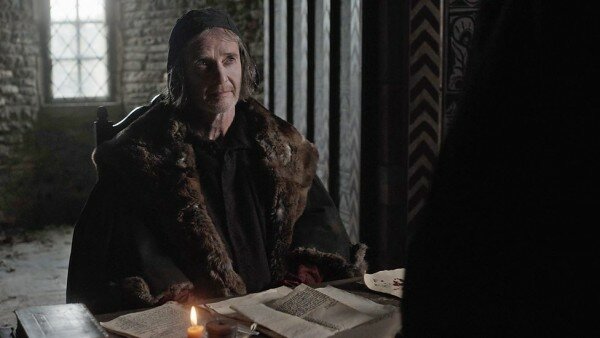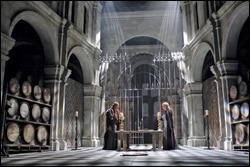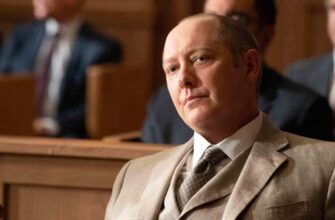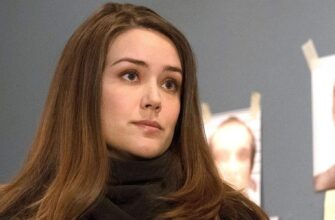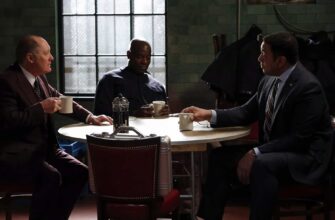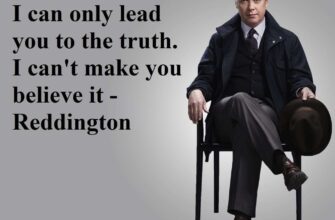Warning: Spoiler Alert
Chapter four of the PBS Masterpiece Theater presentation of the BBC series “Wolf Hall,” dealt mainly with issues of principles and conscience, along with the hypocrisies those subjects highlight. We saw the comparison of two men, both stubborn and set in their ways, with the ultimate wheeler-dealer, doing his best to avoid one of those men, becoming a martyr. Despite the best efforts of Thomas Cromwell, whose shown the ability to look objectively at a situation and predict all the possible outcomes of any situation, England ended up with a martyr.
We saw similar behavior displayed in the previous episode, that time by an associate and friend of Cromwell’s, the lawyer James Bainham. Despite his encounter with torture and recanting previous statements, Bainham felt compelled to read the Bible in English. The book considered blasphemous by Rome, cost Bainham his life, as he couldn’t stop himself from reading the English bible in public. He was burned at the stake in public, before a crowd believing the punishment fit the crime.
This episode opens with a graphic, summing up the story so far. Anne Boleyn promised to bear England’s King Henry VIII a son. So he cast off his first wife and, over the objections of the Pope and Christendom crowned Anne Queen. In September of 1533, Anne returns to Whitehall with her newborn child….a daughter.
The first person we encounter is Henry himself, whose not masking his disappointment, as the only question he asks is if his daughter’s healthy. He walks away leaving behind the Arch Bishop of York, the Lord Chancellor, the Solicitor General and Cromwell. They’d been banking on the Royal Couple having a son, to give Anne the legitimacy by England that the King and Queen sought so desperately. However, the girl to be named Elizabeth just compounded the problem, as she was in reality second in line to the throne following her half-sister Mary, Henry’s daughter with Katherine of Aragon.
Cromwell comes up with a solution to the succession problem, a bill calling for Parliament to declare Mary illegitimate and for only the children of Henry and Anne, be in line to inherit the throne. However, there’s another situation to get resolved, the increased support for the woman from the country who’s said to have visions, of Heaven, Hell and Purgatory, Elizabeth Barton. The Priests who support her, have tried to increase her legendary status among the common-folk, by supplying a letter to Barton, they claim to have been written by Mary Magdalene. Cromwell decides to bring her in for questioning.
Questioned by Henry’s chief advisors, she tells them she’s seen the devil and he looks like a bird, with huge claws. He’s filthy and his claws are covered in blood and feces. She says once he appeared to her as a young man, trying to tempt her and pawed ay her. When she rejected his advances, he spit in her face and she wiped it off with a napkin. She claims the napkin turned black and emitted the stench of Hell. One of her advisors now possesses the napkin and shows to people for a donation to their cause.
She’s asked to explain why Henry hasn’t died, despite her predictions he would die seven months after marrying Anne? She says in God’s eyes, Henry’s not the legitimate King of the country. Cromwell says there are reports that she favors the Courtney family to takeover the throne. She says she’s met with both brothers and their wives and they value her support. She then tells the men that England will be struck by a plague in six months, it will kill Henry, Anne and all of them as well. She then tells Cromwell, that all the members of his family are heretics and will die by the plague. Considering Cromwell lost Liz and his daughters to the “sweating sickness,” this likely struck a nerve.
Turns out Cromwell’s got Barton under close surveillance, the young woman who cares for her is his niece and Barton realizes she’s a fake and she’s very close to confessing she got put up to her performance by those around her. Thomas then has meetings with all the prominent people who met with her, he tells them each to write Henry a letter begging for his mercy. They all follow Cromwell’s directions and he convinces Henry to pardon them all. However there’s a list of people, who’ll get arrested and tried for their associations with Barton.
Anne wants Thomas More to be put on that list, but Cromwell tells her More decried Barton long ago. However she’s insistent on him getting arrested. She considers More to be one of the main contributors to her not being accepted as the rightful Queen by many of her subjects. Henry’s silence on the matter, tells Cromwell he’s got to be proactive on this development.
Henry’s advisors beseech the Queen’s Uncle, the Duke of Norfolk to beg for More not to get arrested. After swearing and acting contrary, he agrees to do it, if Cromwell also joins in. He then cackles saying Anne will scream bloody Hell, when she finds out what he did.
Henry agrees to keeping More off of the arrest notice, in return for his signing the loyalty oath, stating he agrees with the new line of succession. The advisors travel to More’s home and present him with the bill and the loyalty oath. After reading it, he declares although he’ll not speak out against it, or encourage others to, he can’t sign the oath. Cromwell pushes a quill and inkwell towards More, stating that won’t be enough.
The Lord Chancellor, tells More they’re not allowed to let him go home, unless he signs the oath. More asks if he’ll see his daughter again, Cromwell says there’s just the matter of a few words, standing in the way of that. More surrenders himself to the guard, this wasn’t the conclusion that Cromwell hoped for.
Back at home Cromwell’s told by his sister-in-law that More’s wife has come to talk with him. Lady Alice tells her host, the last time she visited his home was a musty old place. She then says her husband always says that you could put Thomas Cromwell in prison, by evening he’d be sitting on cushions and the jailers would owe him money. He then asks Lady Alice to explain why her husband’s being so stubborn?
She says she’s got no idea what motivates his stance. She then asks Cromwell to deliver a message to her husband. She wants him to ask More if his principles are more important than keeping his wife company, giving his son advice or protecting his daughter? She wants Cromwell to stress More’s proper place’s back home with his family.
More won’t back down, or give in. He says he doesn’t cause or wish anyone harm, he just wants to be left alone to live out his days. Cromwell’s head nearly explodes when he hears More’s words, he then asks More if he remembers Cromwell’s friend James Bainham? The man he had on the rack in More’s own home, the man that More’s men beat so badly, he had to get carried to his execution in a chair. Cromwell slams his hands down on More’s desk, then says he should be grateful he’s not receiving the torture he’s inflicted on others. The Lord Chancellor informs More that the King will proceed with More’s indictment and trial.
Back at Whitehall, Cromwell attempts to soften Henry’s stance on the More situation, but the King instead displays a steely-coldness. When Thomas tells his King, the case against More for treason’s slender and getting a guilty verdict won’t be easy, Cromwell sees that he could also find himself out of Henry’s favor if he fails to come through. He tells Cromwell, that he didn’t bring the son of a blacksmith on for easy assignments. He says Cromwell’s a serpent, but he best not be a viper in Henry’s bosom, he has his assignment, go carry it out. For the first time we see Cromwell with his confidence shaken, he realizes that Henry’s loyalty will only last as long as Cromwell’s effective.
Thomas goes to visit More by himself, he tells the former Lord Chancellor that he’s been instructed to take away the man’s pens, papers and books. More lets out a sigh, then says fine you might as well take them all now. Cromwell pulls the loyalty oath out of his pocket and puts it in front of More. He then tells him his wife came to see him, she wants More home and his family does as well. He says that he’ll supply the barge to escort More home, that soon he can be back in his own bed.
When he realizes More’s refusing to cooperate, he asks if More’s not afraid of the pain he knows that he’ll soon experience. The prisoner admits he’s terrified, but he says the pain won’t be for long and God will erase the memory after it’s over. Cromwell leaves the cell and asks that Richard Riche personally removes all the pens, papers and books from More’s cell.
The day of the trial arrives and Riche says that if they lose the jury, the King will skin them alive. Thomas corrects him, saying it will be Anne who does the skinning. More enters the courtroom looking frail and weak, trying to elicit sympathy from the Parliament members that will determine his fate.
Riche questions More about the conversation that the two of them had when the Solicitor General, took away all of More’s possessions. He states that More said that if Parliament wanted to they could name Riche as the new King of England, but they couldn’t choose Riche to be God. Furthermore, Parliament lacked the authority to name Henry head of the Church Of England.
More tries denying they had that conversation, but his patience quickly wears out and his anger kicks in and he says that Riche’s as important as the devil’s spit. The Lord Chancellor says to address the Solicitor General with the respect he deserves, but More melts down and Parliament quickly convicts him of treason.
The ruling’s announced but before they sentence him, the Lord Chancellor asks More if he has any words on his own behalf. More says he no longer has to keep his tongue in check, then proceeds to rip Henry and Parliament apart verbally. Soon his words are drowned out by the boos of Parliament.
More gets his head chopped off in a public display, Cromwell stands in the crowd and flashes back to his childhood. We see young Thomas as a serving boy, likely about five or six years old and More’s a 14-year-old scholar, already being hailed as a genius by his elders. Thomas remembers watching some of the students playing in the courtyard, but More was in his room, playing his recorder in front of his open window. The young Cromwell waved to the teen, who then shut his window.
Soon after the beheading, Cromwell gets incredibly sick and seems near death as he’s burning with fever and delirious. He thinks Johane’s his late wife Liz and begs her to let him love her. The doctor comes and Cromwell says that if he’s dying he needs to speak to his son Gregory, he’s there but Cromwell passes out. He seems to wake up the next morning, but we realize he’s dreaming as Liz’s next to him in bed. He then wakes up in reality, finding himself alone, his fever broke and he’ll be fine.
Cromwell gets dressed and comes down to his study, giving Rafe the itinerary for the King’s upcoming Summer Progress. He ticks off a bunch of locations, then suddenly stops. Rafe asks him what’s wrong and he tells the young man to insert a five-day visit to Wolf Hall, the home of Sir John Seymour and family in early September.
Sir John and his family come down to welcome the Royal party and he and Henry exchange pleasantries. A couple of rows back stands Seymour’s daughter Jane and she and Cromwell make eye contact with each other.
The Story Continues Next Sunday Night at 10:00 pm on Your Local PBS Affiliate.
